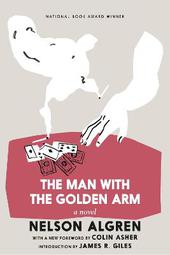
|
The Man With The Golden Arm
Paperback / softback
Main Details
| Title |
The Man With The Golden Arm
|
| Authors and Contributors |
By (author) Nelson Algren
|
| Physical Properties |
| Format:Paperback / softback | | Pages:368 | | Dimensions(mm): Height 210,Width 140 |
|
| Category/Genre | Modern and contemporary fiction (post c 1945) |
|---|
| ISBN/Barcode |
9781644212158
|
| Classifications | Dewey:813.52 |
|---|
| Audience | |
|---|
|
Publishing Details |
| Publisher |
Seven Stories Press,U.S.
|
| Imprint |
Seven Stories Press,U.S.
|
| Publication Date |
31 January 2023 |
| Publication Country |
United States
|
Description
A novel of rare genius, The Man with the Golden Arm describes the dissolution of a card-dealing WWII veteran named Frankie Machine, caught in the act of slowly cutting his own heart into wafer-thin slices. For Frankie, a murder committed may be the least of his problems. The literary critic Malcolm Cowley called The Man with the Golden Arm "Algren's defense of the individual," while Carl Sandburg wrote of its "strange midnight dignity." A literary tour de force, here is a novel unlike any other, one in which drug addiction, poverty, and human failure somehow suggest a defense of human dignity and a reason for hope. Seven Stories Press separately publishes the critical edition of The Man with the Golden Arm, the first critical edition of an Algren work, featuring an extra 100+ pages of insightful essays by Russell Banks, Bettina Drew, James R. Giles, Carlo Rotella, William Savage, Lee Stringer, Studs Terkel, Kurt Vonnegut,and others.
Author Biography
One of the most neglected American writers and also one of the best loved, NELSON ALGREN wrote once that "literature is made upon any occasion that a challenge is put to the legal apparatus by conscience in touch with humanity." His writings always lived up to that definition. He was born on March 28, 1909, in Detroit and lived mostly in Chicago. His first short fiction was published in Story magazine in 1933. In 1935 he published his first novel, Somebody in Boots. In early 1942, Algren put the finishing touches on a second novel and joined the war as an enlisted man. By 1945, he still had not made the grade of Private first class, but the novel Never Come Morning was widely praised and eventually sold over a million copies. Jean-Paul Sartre translated the French-language edition. In 1947 came The Neon Wilderness, his famous short story collection which would permanently establish his place in American letters. The Man with the Golden Arm, generally considered Algren's most important novel, appeared in 1949 and became the first winner of the National Book Award for Fiction in March 1950. Then came Chicago- City on the Make (1951), a prose poem, and A Walk on the Wild Side (1956), a rewrite of Somebody in Boots. Algren also published two travel books, Who Lost an American? and Notes from a Sea Voyage. The Last Carousel, a collection of short fiction and nonfiction, appeared in 1973. He died on May 9, 1981, within days of his appointment as a fellow of the American Academy and Institute of Arts and Letters. His last novel, The Devil's Stocking, based on the life of Hurricane Carter, and Nonconformity- Writing on Writing, a 1952 essay on the art of writing, were published posthumously in 1983 and 1996 respectively. In 2009 came Entrapment and Other Writings, a major collection of previously unpublished writings that included two early short story masterpieces, "Forgive Them, Lord," and "The Lightless Room," and the long unfinished novel fragment referenced in the book's title. COLIN ASHER is the author of Never a Lovely So Real (W.W. Norton, 2019), the definitive biography of Nelson Algren. An instructor at CUNY, he was a 2015/2016 Fellow at the Leon Levy Center for Biography.
Reviews"The finest American novel published since the war." -Washington Post Book World "A true novelist's triumph." -Time "Algren is an artist whose sympathy is as large as Victor Hugo's, an artist who ranks, with this novel, among our best American authors." -Chicago Sun-Times "Powerful, grisly, antic, horrifying, poetic, compassionate ... [there is] virtually nothing more that one could ask." -New York Times Book Review
|